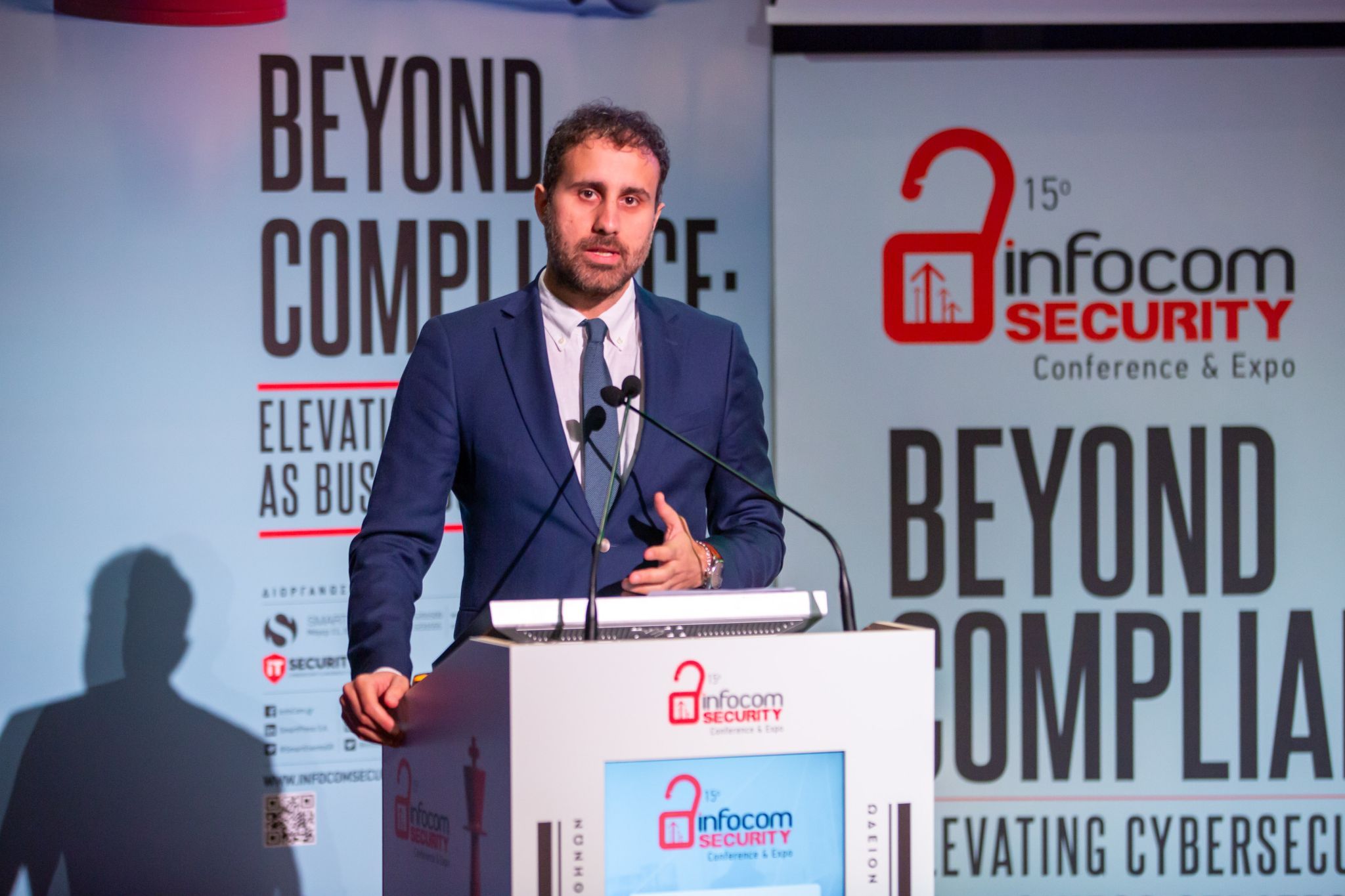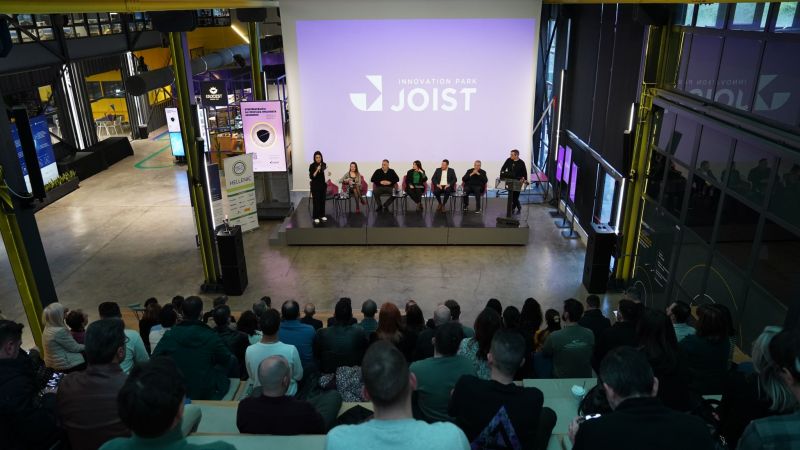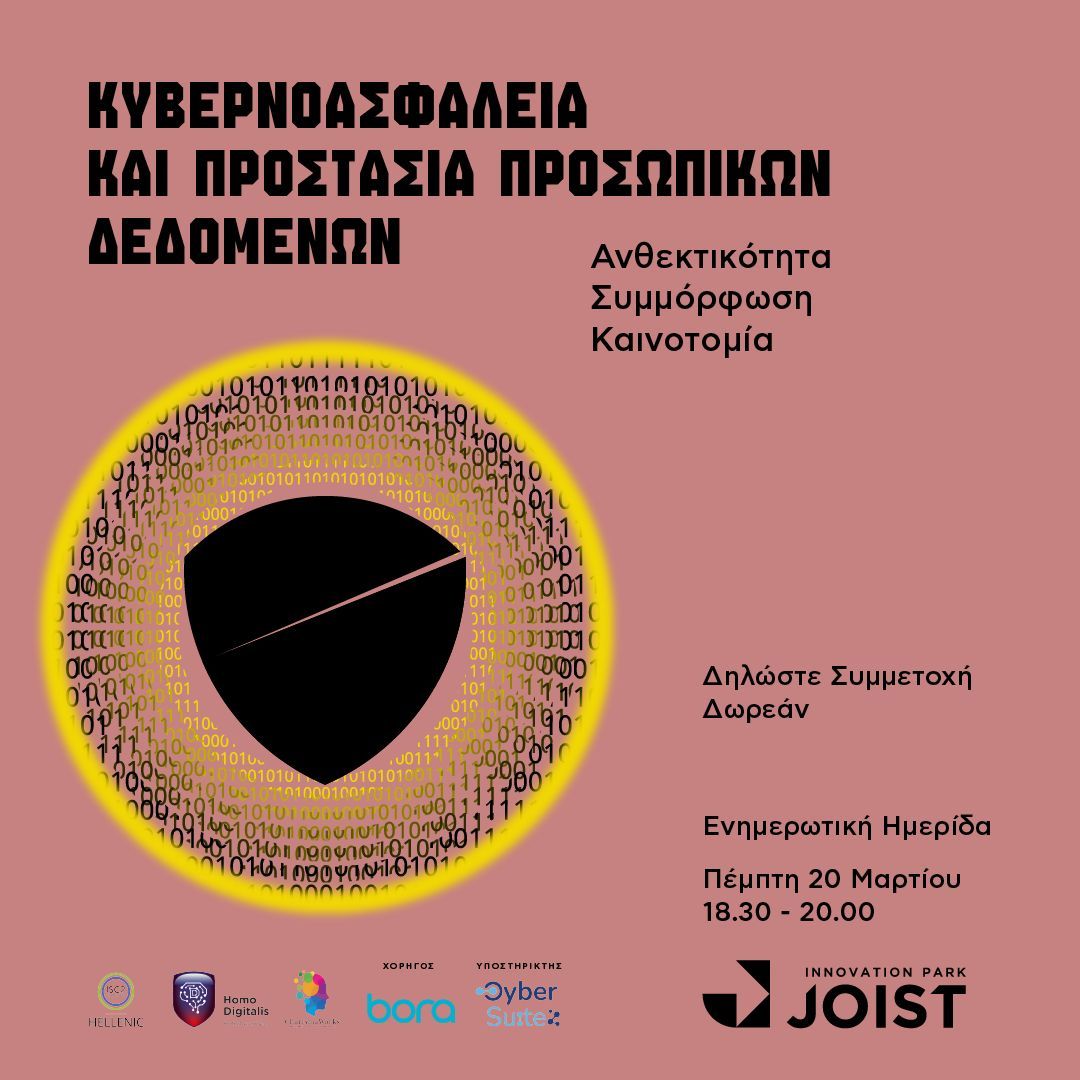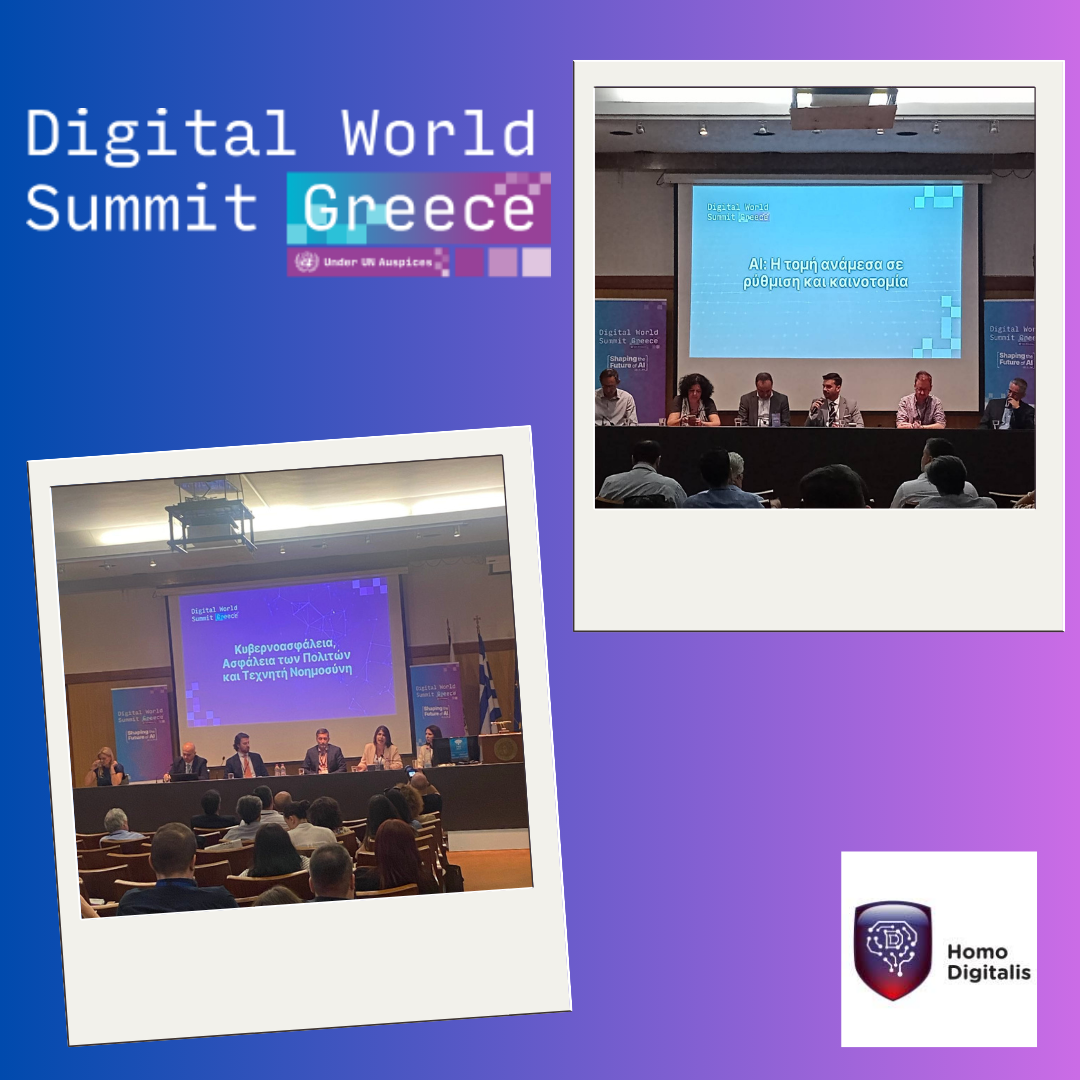Homo Digitalis at Startup Europe Week 2025 of JOIST Park
Στις 13 Μαΐου, σε περιμένουμε στο JOIST Innovation Park, εκεί όπου η καινοτομία συναντά τις ευκαιρίες.
Το φετινό event συγκεντρώνει πρωτοπόρους στην τεχνητή νοημοσύνη, την κυβερνοασφάλεια, την επιστημονική έρευνα και την επιχειρηματικότητα χωρίς σύνορα – για μια ημέρα γεμάτη τολμηρές ιδέες και ουσιαστικό αντίκτυπο.
Τι περιλαμβάνει το πρόγραμμα;
AI, Cybersecurity, and the Future of Startups
• Λαμπρινή Γυφτοκώστα – Homo Digitalis
• Αναστάσιος Αραμπατζής – Ειδικός Κυβερνοασφάλειας
• Παναγιώτης Πιέρρος – TicTac S.A.
Bridging the Gap: Turning European Scientific Research into Startups
• Ιωάννης Κουρούτζης – Πανεπιστήμιο Θεσσαλίας
• Φώτης Τέκος – Foodoxys / Olea Fortius
• Κέλλυ Παπαδοπούλου – Pi tech
• Κωνσταντίνος Ακρίβος – Indeex
Scaling Startups Across Borders in Europe
• Λάμπρος Κούρτης – Επενδυτής & Μέλος VC
• Manuel Seuffert – IMP³ROVE Academy
• Αχιλλέας Μπαρλάς – Enterprise Europe Network Hellas
Είσαι έτοιμος να συνδεθείς με το ευρωπαϊκό startup οικοσύστημα;
Κάνε εγγραφή εδω.
Homo Digitalis' Speech at the 15th InfoCom Security Conference 2025 Concluded Successfully
The 15th InfoCom Security Conference 2025 was successfully completed, with Homo Digitalis once again offering its patronage to the event!
Our Board of Directors was represented by Konstantinos Kakavoulis, who also delivered the opening address on the second day of the conference.
We warmly thank the organizing team (SmartPress S.A., Vasilis Amanatidis, IT Security Pro) for the excellent collaboration throughout the event.
Homo Digitalis co-organized and participated in the event "Cybersecurity and Data Protection: Resilience, Compliance, Innovation" at JOIST
Two weeks ago, Homo Digitalis co-organized and participated in the event “Cybersecurity and Data Protection: Resilience, Compliance, Innovation” at JOIST Innovation Park, in Larissa, Greece.
Our Director on Human Rights & AI, Lamprini Gyftokosta represented us there, while our member Anastasios Arampatzis representing Bora – Cybersecurity Marketing moderated the discussion!
With a focus on raising awareness among SMEs and entrepreneurs on data protection and cybersecurity, our panel brought together key experts to explore security, compliance, and innovation, ensuring a privacy preserving digital future.
The list of our esteemed co-panelists included:
-Michail Bletsas Governor, National Cybersecurity Authority
-Panagiotis Soulos – ISC2 Hellenic Chapter, Audit Committee Member, Information Security GRC Senior Manager, STEELMET Corporate Services
-Yiannis Koukoùras – ISC2 Hellenic Chapter Member, Managing Director, TwelveSec
-Karina Iskandarova – Founder, CharismaWorks
A huge thank you to JOIST’s team and the rest of co-organizers, speakers, and participants for this wonderful evening.
We Sponsor and Speak at the 15th InfoCom Security 2025!
We are excited to announce that Homo Digitalis is once again offering its sponsorship to the 15th InfoCom Security 2025! This special anniversary edition will take place on April 2 & 3 at the Athens Conservatory.
Our Board Member, Konstantinos Kakavoulis, will proudly represent us at the event and deliver the opening keynote speech on the second day of the conference!
Registrations are open and free!
You can secure your spot and explore the full two-day agenda here.
A huge thank you to the organizing team (SmartPress S.A., IT Security Pro) for the excellent collaboration in making this event possible!
We are co-organizing an event on Cybersecurity and Personal Data Protection at the JOIST Innovation Park in Larissa!
On March 20, 2025, from 18:00 to 20:30, Homo Digitalis is delighted to co-organize and participate in the event “Cybersecurity and Personal Data Protection: Resilience, Compliance, Innovation” at the JOIST Innovation Park in Larissa!
The event aims to raise awareness and empower businesses of all industries and sizes so they can become resilient and innovate safely while respecting citizens’ rights.
Speakers at the event include:
Michail Bletsas, Head of the National Cybersecurity Authority
Panagiotis Soulos, Member of ISC2 Hellenic Chapter, Information Security GRC Senior Manager at STEELMET Corporate Services
Lamprini Gyftokosta, Director of Human Rights & Artificial Intelligence at Homo Digitalis
Giannis Koukouras, Member of ISC2 Hellenic Chapter, Managing Director at TwelveSec
Karina Iskandarova, Founder of CharismaWorks
The event will be moderated by Anastassios Arabatzis from Bora – Cybersecurity Marketing and Homo Digitalis.
Register for free here.
Homo Digitalis' participation in the Digital World Summit Greece was a great success
Homo Digitalis had the great honor and pleasure to be present with double representation at the Digital World Summit Greece, today Tuesday, May 28th at the National Hellenic Research Foundation!
Specifically, our Vice President and Partner at Digital Law Experts (DLE), Stefanos Vitoratos, participated as a moderator in the 1st panel of the conference, on the topic “#AI: The intersection between regulation and innovation”, in a fascinating discussion with speakers such as Dimitris Gerogiannis (President AI Catalyst), Lilian Mitrou (Professor, Department of Information & Communication Systems Engineering, University of the Aegean), Charalambos Tsekeris (President of the National Bioethics & Technology Ethics Committee), Yannis Mastrogeorgiou (Special Secretary for Long Term Planning, Presidency of the Greek Government) and Fotis Draganidis (Director of Technology at Microsoft Hellas).
Our Director for Human Rights & Artificial Intelligence, Lamprini Gyftokosta, was a speaker at the 2nd panel of the Digital World Summit Greece 2024, on “Cybersecurity, Citizen Security and Artificial Intelligence”! The panel was moderated by Konstantinos Anagnostopoulos (Co-founder & Director, Athens Legal Tech), while Natalia Soulia (Senior Associate | Privacy, Data Protection & Cybersecurity, KG Law FIrm) was also present as a speaker, Thomas Dobridis (Head of the General Directorate of Cybersecurity, Ministry of Digital Governance), Antonis Broumas (Head of Law and Technology, EY Platis-Anastasiades) and Stella Tsitsoula (Founder, RED. comm, Co-Founder | Women4Cyber GR | Founder Hellenic Cybersecurity Institute)!
We would like to thank the organizers for their kind invitation, as every year, to this important conference.
Homo Digitalis with double representation at Digital World Summit Greece
Homo Digitalis has the great honor and pleasure to participate with double representation at the Digital World Summit Greece, on Tuesday 28 May at the National Hellenic Research Foundation!
Specifically, our Vice President and Partner at Digital Law Experts (DLE), Stefanos Vitoratos, will participate as a moderator in the 1st panel of the conference, on the topic “AI: The intersection between regulation and innovation”, in a fascinating panel discussion featuring Dimitris Gerogiannis (President AI Catalyst), Lillian Mitrou (Professor, Department of Information & Communication Systems Engineering, University of the Aegean), Charalambos Tsekeris (President of the National Bioethics & Technology Ethics Committee), Yannis Mastrogeorgiou (Special Secretary of Long Term Planning, Presidency of the Greek Government) and Fotis Draganidis (Director of Technology at Microsoft Hellas).
Our Director for Human Rights & Artificial Intelligence, Lambrini Gyftokosta, will participate as a speaker in the 2nd panel of the Digital World Summit Greece 2024, on the topic “Cybersecurity, Citizen Security and Artificial Intelligence”! This very interesting panel will be moderated by Konstantinos Anagnostopoulos (Co-founder & Director, Athens Legal Tech), while Natalia Soulia (Senior Associate | Privacy, Data Protection & Cybersecurity, KG Law FIrm), Thomas Dombridis (Head of the General Directorate of Cybersecurity of the Ministry of Digital Governance), Antonis Broumas (Head of the Law Department of the Ministry of Digital Governance), Antonis Broumas (Head of the Law Department of the Ministry of Digital Governance), and the Head of the Law Department of the Ministry of Justice of the Republic of Greece) will also be present as speakers.
You can register and read more about the conference and its programme here.
From Clean Monday to Cyber Cleanliness: Bridging Traditions with Modern Cyber Hygiene Practices
By Anastasios Arampatzis and Ioannis Vassilakis
In the heart of Greek tradition lies Clean Monday, which marks the beginning of Lent leading to Easter and symbolizes a fresh start, encouraging cleanliness, renewal, and preparation for the season ahead. This day, celebrated with kite flying, outdoor activities, and cleansing the soul, carries profound significance in purifying one’s life in all aspects.
Just as Clean Monday invites us to declutter our homes and minds, there exists a parallel in the digital realm that often goes overlooked: cyber hygiene. Maintaining a clean and secure online presence is imperative in an era where our lives are intertwined with the digital world more than ever.
Understanding Cyber Hygiene
Cyber hygiene refers to the practices and steps that individuals take to maintain system health and improve online security. These practices are akin to personal hygiene routines; just as regular handwashing can prevent the spread of illness, everyday cyber hygiene practices can protect against cyber threats such as malware, phishing, and identity theft.
The importance of cyber hygiene cannot be overstated. In today’s interconnected world, a single vulnerability can lead to a cascade of negative consequences, affecting not just the individual but also organizations and even national security. The consequences of neglecting cyber hygiene can be severe:
- Data breaches.
- Identity theft.
- Loss of privacy.
As we celebrate Clean Monday and its cleansing rituals, we should also adopt cyber hygiene practices to prepare for a secure and private digital future free from cyber threats.
Clean Desk and Desktop Policies – The Foundation of Cyber Cleanliness
Just as Clean Monday encourages us to purge our homes of unnecessary clutter, a clean desk and desktop policy is the cornerstone of maintaining a secure and efficient workspace, both physically and digitally. These policies are not just about keeping a tidy desk; they’re about safeguarding sensitive information from prying eyes and ensuring that critical data isn’t lost amidst digital clutter.
- Clean Desk Policy ensures that sensitive documents, notes, and removable storage devices are secured when not in use or when an employee leaves their desk. It’s about minimizing the risk of sensitive information falling into the wrong hands, intentionally or accidentally.
- Clean Desktop Policy focuses on the digital landscape, advocating for a well-organized computer desktop. This means regularly archiving or deleting unused files, managing icons, and ensuring that sensitive information is not exposed through screen savers or unattended open documents.
The benefits of these policies are profound:
- Reduced risk of information theft.
- Increased efficiency and enhanced productivity.
- Enhanced professional image and competence.
The following simple tips can help you maintain cleanliness:
- Implement a Routine: Just as the rituals of Clean Monday are ingrained in our culture, incorporate regular clean-up routines for physical and digital workspaces.
- Secure Sensitive Information: Use locked cabinets for physical documents and password-protected folders for digital files.
- Adopt Minimalism: Keep only what you need on your desk and desktop. Archive or delete old files and dispose of unnecessary paperwork.
Navigating the Digital Landscape: Ad Blockers and Cookie Banners
Using ad blockers and understanding cookie banners are essential for maintaining a clean and secure online browsing experience. As we carefully select what to keep in our homes, we must also choose what to allow into our digital spaces.
- Ad Blockers prevent advertisements from being displayed on websites. While ads can be a source of information and revenue for site owners, they can also be intrusive, slow down web browsing, and sometimes serve as a vector for malware.
- Cookie Banners inform users about a website’s use of cookies. Understanding and managing these consents can significantly enhance your online privacy and security.
To achieve a cleaner browsing experience:
- Choose reputable ad-blocking software that balances effectiveness with respect for websites’ revenue models. Some ad blockers allow non-intrusive ads to support websites while blocking harmful content.
- Take the time to read and understand what you consent to when you agree to a website’s cookie policy. Opt for settings that minimize tracking and personal data collection where possible.
- Regularly review and clean up your browser’s permissions and stored cookies to ensure your online environment remains clutter-free and secure.
Cultivating Caution in Digital Interactions
In the same way that Clean Monday prompts us to approach our physical and spiritual activities with mindfulness and care, we must also navigate our digital interactions with caution and deliberateness. While brimming with information and connectivity, the digital world also harbors risks such as phishing scams, malware, and data breaches.
- Verify Before You Click: Ensure the authenticity of websites before entering sensitive information, and be skeptical of emails or messages from unknown sources.
- Use BCC in Emails When Appropriate: Sending emails, especially to multiple recipients, should be handled carefully to protect everyone’s privacy. Using Blind Carbon Copy (BCC) ensures that recipients’ email addresses are not exposed to everyone on the list.
- Recognize and Avoid Phishing Attempts: Phishing emails are the digital equivalent of wolves in sheep’s clothing, often masquerading as legitimate requests. Learning to recognize these attempts can protect you from giving away sensitive information to the wrong hands.
- Embrace skepticism in your online interactions: Ask yourself whether information shared is necessary, whether links are safe to click, and whether personal data needs to be disclosed.
Implementing a Personal Cyber Cleanliness Routine
Drawing inspiration from the rituals of Clean Monday, establishing a personal routine for cyber cleanliness is beneficial and essential for maintaining digital well-being. The following steps can help show a cleaner digital life.
- Enable Multi-Factor Authentication (MFA) wherever it is possible to keep unauthorized users out of personal accounts.
- Periodically review privacy settings on social media and other online platforms to ensure you only share what you intend to.
- Unsubscribe from unused services, delete old emails and remove unnecessary files to reduce the cognitive load and make it easier to focus on what’s important.
- Just as Clean Monday marks a time for physical and spiritual cleansing, set specific times throughout the year for digital clean-ups.
- Keep abreast of the latest in cybersecurity to ensure your practices are up-to-date. Knowledge is power, particularly when it comes to protecting yourself online.
- Share your knowledge and habits with friends, family, and colleagues. Just as traditions like Clean Monday are passed down, so too can habits of cyber cleanliness.
Embracing a Future of Digital Cleanliness and Renewal
The principles of Clean Monday can also be applied to our digital lives. Maintaining a healthy, secure digital environment is a continuous commitment and requires regular maintenance. We take proactive steps toward securing our personal and professional data by implementing clean desk and desktop policies, navigating the digital landscape with caution, and cultivating a routine of personal cyber cleanliness. Let us embrace this opportunity for a digital clean-up and create a safer digital world for all.
Our joint campaign for Cybersecurity Month with the Share Foundation has been launched
Together with the Share Foundation and other civil society organisations, we are participating in a joint campaign for European Cyber Security Month!
Through puzzles, we are clarifying some key terms and tools related to our safe and private online browsing!
If you want to participate, you can follow Homo Digitalis on our social media (X, LinkedIn, Facebook and Instagram) to solve the puzzles and get informed yourself!








